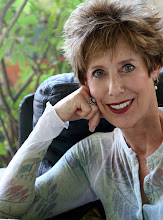I was musing the other day about the power of words. Most of us talk and talk and talk and it becomes an unconscious stream of, well, our unconscious mind. But words are, indeed, a powerful force in our universe. We can use them for good or for evil.
When I attended the Keynote Speaker's Conference in January sponsored by the National Speakers Association, I heard a woman speak on the importance of how we use words when we communicate. This terrific speaker elevated word usage to an art form. I was completely involved in her insights into how the use of a different words can alter the tone and style of a speech, a meeting, a gathering, a dialogue between two people. Her reference for precision about how words are chosen was specifically directed to business management and management styles in corporations. Those of use who have worked for companies are particularly sensitive to the nuances of word choices in difficult workplace situations. And those of use who have lost friends with our unconscious responses know the consequences the unintended remarks will produce. I lost a friend because I didn't choose my words carefully enough, although I think that girlfriend was looking for a reason to get me out of her life.
In my profession as a yoga instructor, I am choosing words in every class to describe physical positions as well as spiritual intent. I have to be perfectly present to do this kind of teaching. After class, I want down time. I'm not inclined to carry on conversations at length between classes. So I was particularly interested in an article on mindful communication that I just read in the latest Yoga Journal. The article suggested that when and if a person wants to speak, the following questions might be considered: (1) Will you tell the truth? (2) Will you be kind? (3) Is it necessary?
I'm a writer and on paper I choose my words carefully, or at least I try to be mindful that written communication sends out as much energy into the universe as does spoken language.
Before we speak or write it is necessary to have clarity of thought - a clear mind - and clear intention. This concept of clarity of mind and intention allows us to draw deeper into the best of our being and communicate with an open heart. Conscious communication sends out powerful energy into the universe. Truthful communication draws listeners closer to the source of those who speak the truth.
Have you ever walked into an empty room and felt a residual energy? Or walked into a room where no one was talking and felt a collective positive energy/or negative energy? Mindful communication fills a space with truth, kindness, and purpose. It's an awesome concept to contemplate, and it's a challenging practice to aspire to as communicators. Good communicators are honest and believable and others will gravitate toward their energy and try to catch some of it for themselves.
I'm certainly not the greatest writer on the planet by far, but when I wrote my memoir, Sixty, Sex, & Tango, Confessions of a Beatnik Boomer, I went through the book with my B.S. detector because honesty was the most important ingredient for writing a confessional. And I literally had to question my honesty at almost every turn of phrase. It was exhausting and exciting at the same time because I was able to expose my vulnerability all the way through the book. As a result, readers have told me frequently that reading my book was like sitting in a room with me and listening to me talk an expose my foibles and mistakes and do it with my customary self-deprecating humor. So my book was truthful, I hope, and mostly kind, but whether it was necessary or not, well, that's up to the public.
Mindful communication is one of those things in life that you really have to practice and pay attention to, and it requires a whole lot of consciousness raising. Lapsing into unconscious responses without clear intention and thought will always get you into trouble. It's really better to talk pretty to each other and our connections will be the stronger for it.
Namaste
Joan



No comments:
Post a Comment